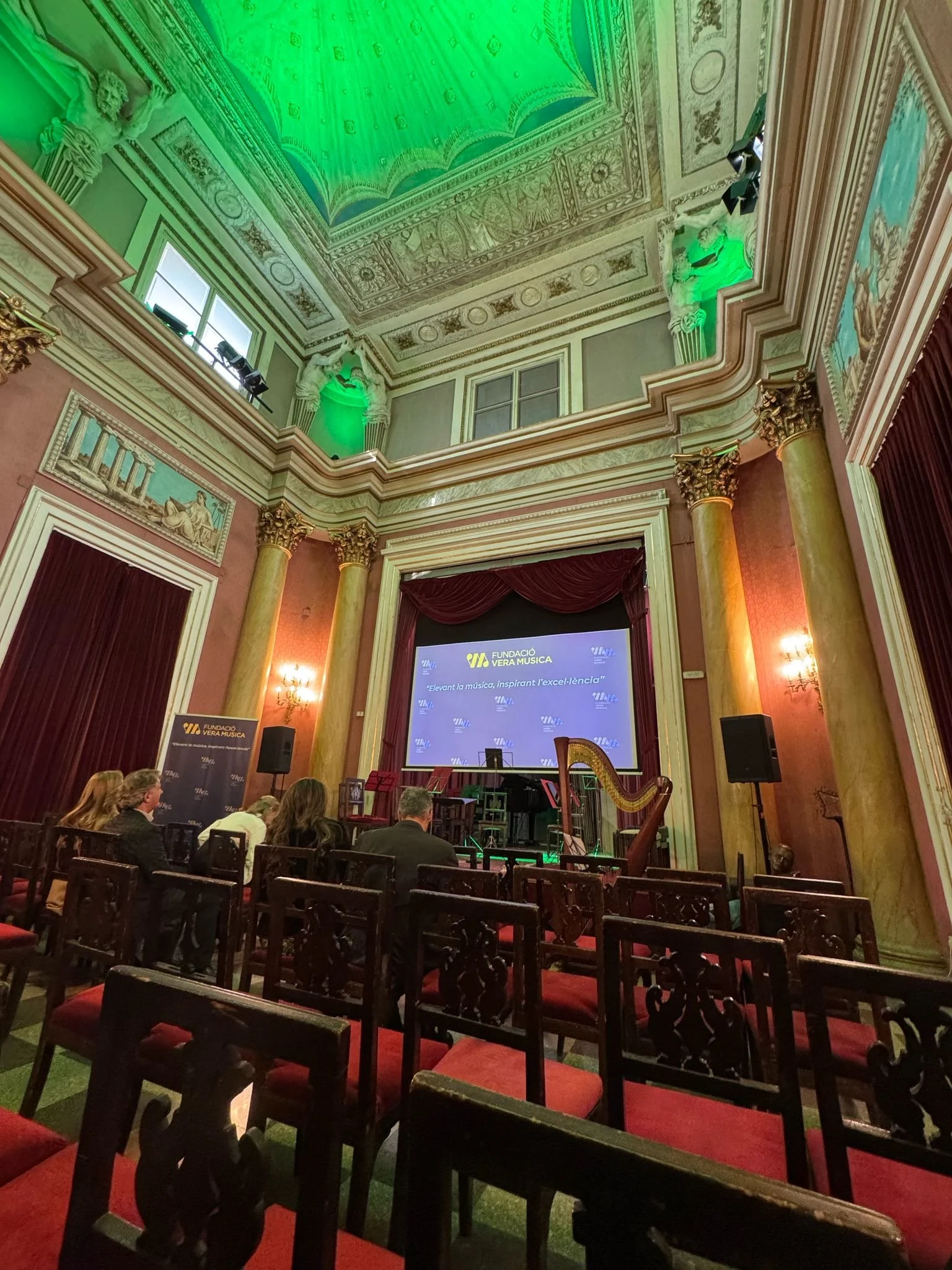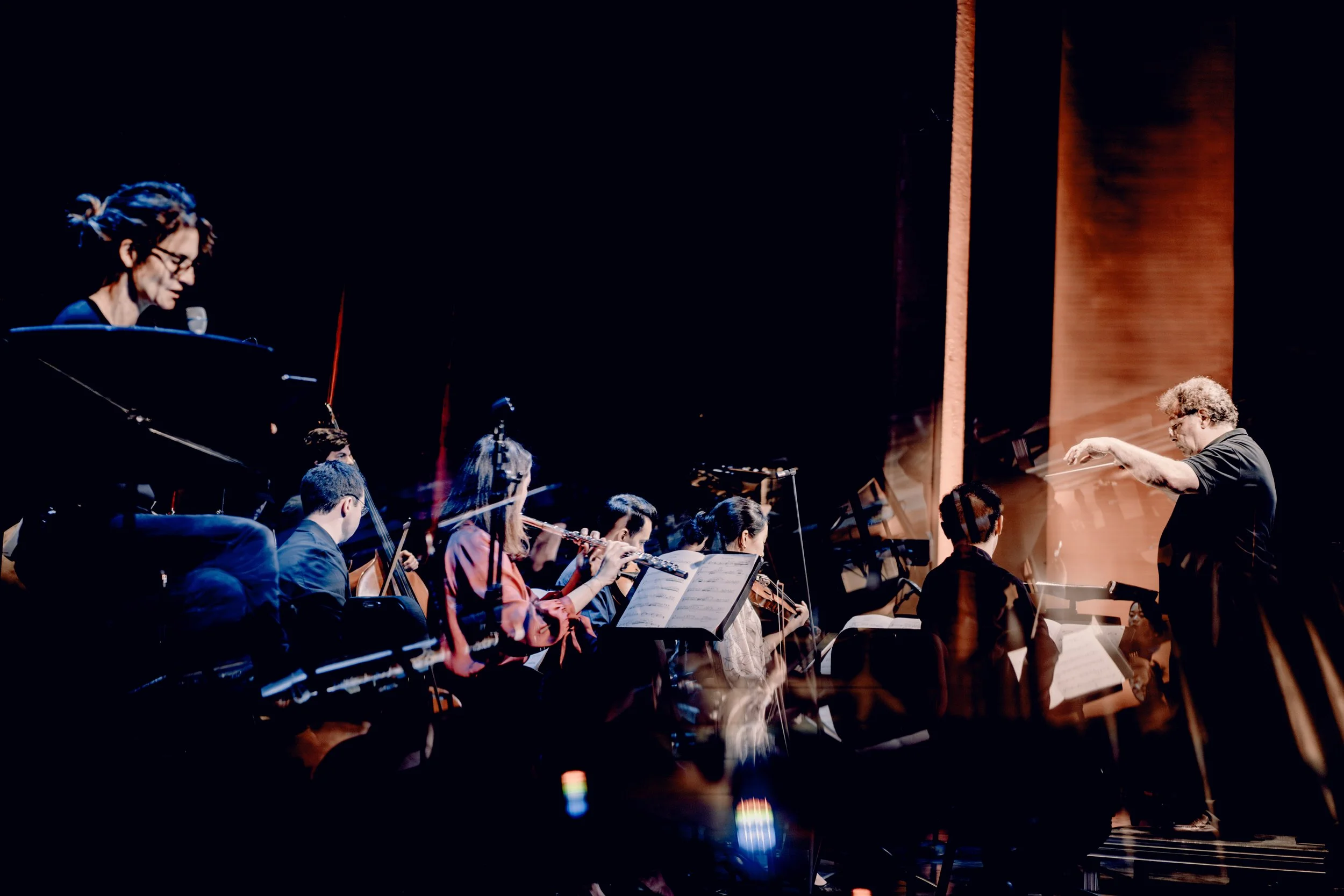From Catalan heritage to Global Exchange: Composer Marc Migó Cortés – on becoming this season’s AHF Artist In Spotlight and leading the Vera Musica Foundation in Barcelona
by Ilona Oltuski
Marc Migó by Andrej Grilc
“I never anticipated such a meaningful entry into the German musical scene; it is a tremendous honor,” remarks Marc Migó on being named the Berlin Althafen Foundation’s 2024/2025 season’s Artist in Spotlight. While such tributes in support of extraordinary artistic talent recognition are certainly not predictable, they are undoubtedly the result of the initiative and the process that transformed the dreams of a young Catalan pianist on a student visa to New York City into a successful career as a composer and visionary artistic director of the newly established Fundación Vera Musica in Barcelona.
“Moving to New York in 2017 was a turning point in my life,” describes Migó, “Juilliard placed me on a CV Starr Fellow Grant amongst an extraordinary pool of international talent and fostered lasting relationships that continue to shape my artistic life,” he shares. Among these influences, he mentions violinist, pedagogue, and scholar Max Tan, with whom he later shared a doctoral class, and whose “insights on historical recordings and performance practice sharpened my critical ear,” he says.
With cellist Mark Prihodko, a fellow young student during his early Juilliard years, he stayed in close contact, only intermittently interrupted by the pandemic, during which Prihodko moved to Berlin, to continue his studies in Weimar, while quickly gaining his footing in Berlin’s cultural scene as the new artistic director of the Althafen Foundation.
“Over time, I have come to see the importance of building a troupe – a close-knit circle of collaborators who are not only gifted artists but also generous, grounded individuals. Both Mark and Max always loved music, but they also had ambitions of building something that would reach the world beyond the practice room or even the stage. They have this extraordinarydimension of entrepreneurial ideas about how the future of music can be shaped to bring about positive change,” he shares. “Thanks to Mark and his entrepreneurial drive, I did start to explore artistic direction and production. This, I now realize, truly complements and enriches my most essential role as a composer,” he contemplates, looking back on many further collaborations with artists he met through Prihodko’s Berlin activities.
“And then there is my father. While I was always drawn to music, I also admired the creative spirit he consistently demonstrated in numerous ways. He's not a musician; he's a businessman who travels a lot. From an early age, I've had the opportunity to experience both worlds, and I've always wondered what would happen if we were to creatively combine the essence of both—the artistic and the business worlds. I recognized that my father’s entrepreneurial vision, organizational skills, and my passion for fighting for music and different voices that deserve to be heard through creative international collaborations, could bring about many fantasticopportunities for young musicians, “ he describes, connecting the more global aspect of his vision with the measurable outcomes of the goals he pursues for the local arts community in Barcelona, with the 2024 established Fundación Vera Musica. With its headquarters situated in the historic palace of the Reial Cercle Artístic de Barcelona, whose resident orchestra was founded by the renowned Catalan composer Enrique Granados, it certainly boasts a richlineage of art and music.
Real Circulo Artistico de Barcelona
"In Spain, the music scene is a bit dogmatic, much more so than it is here in the US, where there is more room for eclecticism and finding your inner voice, “ he shares. “I benefited so much from that exposure and would like to bring it home and, in turn, showcase many of the hidden treasures we have in Spain, and the European tradition, which is missing here,” he explains, describing his vision for an international exchange that would have a liberating, cross-cultural impact.
Multiple awards, among them Juilliard’s orchestral composition award (2018;2021), the Pablo Casals Award (2019), the George Enescu Prize (2020), Organ Taurida Competition’s First Prize (2021), the inaugural Dominic Argento Fellowship for Opera Composition (2021), and the Leo Kaplan Award (2023), have recognized Migó's talent even before he finished his studies with John Corigliano — whom Migó calls a master of unapologetic romanticism —and receiving his doctorate in composition in 2024. Talking about the Neo-Romantic idiom, he welcomes the AHF Berlin residency as a further opportunity opening the artistic exchange for new music:” I have always admired Germany’s rich cultural legacy, but approached its contemporary music world with some caution, aware of its historic resistance to more communicative forms of expression. It’s encouraging to witness a shift taking place – a broadening of perspectives –and I feel deeply grateful to be part of this exciting evolution. These are stimulating times, and I am humbled to be included in them,” he exclaims passionately, as he continues to describe his latest work and the concert collaboration he has been working on intensely. The title of this work, Carnaval de las Indias, the n e w Carnival, recalls Camille Saint-Saëns' iconic namesake, "Carnival of the Animals."
As part of the Soundbox Camerata Project, the 45-minute score for flute, clarinet, percussionist, narrator, two pianos, and strings has already been awarded a $20,000 grant from the Howard Gilman Foundation for the performance of a concert premiering a new work that features notable musicians and explores diverse narratives for audiences in New York.
On July 22, 2025, presented by Vera Musica Foundation, Martha Argerich will premiere Carnaval de las Indias’ performance in Barcelona at the stunning Palau de la Música Catalana — learn more.
“This is astounding on many levels,” he describes, “not only because Martha is taking on a new work at 84, but also because of the profound story behind the piece. The libretto for Migó’s score was written by the Argentinian playwright Gonzalo Demaría, the director of the Teatro de Cervantes in Buenos Aires, who – following the score’s Latin American mythological inspiration – included parts of a 16th century written account (Bestiario de Indias - Bestiary of the Indies) by the first chronicler of the Indies on the nature of the New World, Gonzalo Fernández Oviedo.
Migó credits his close relationship with the Argentinian pianist Alan Kwiek, a protégé of the iconic Argentinian pianist Martha Argerich and her daughter Annie Argerich-Dutoit, for the momentous collaboration that drew on their mutual Latin sensibilities, humor, and profoundunderstanding of the score for chamber orchestra and voice.
“Of course, it was so special to be able to bring in Martha for the concert. But as much as I was thinking of her, writing the piano score, I did not solely do it because of the opportunity. I simply wanted to create the best music possible,” he explains. As a homage to their friendship, he dedicated the piece to Annie and Alan.
by Andrej Grilc
Both Marc and Mark are young musicians who are part of the leadership of their generation, seeking to redefine new formats in the music industry and “renew classical music from a contemporary perspective,” as quoted from Vera Musica’s mission. By enabling an ongoing exchange within their expanding global network, they aim to increase local opportunities, fostering a more streamlined approach to artist career development and placement. And whobetter to symbolize such a collaborative spirit than Martha, the veteran protagonist of the classical stage, presenting Migó’s intriguingly esoteric work, filled with artistic promise.



